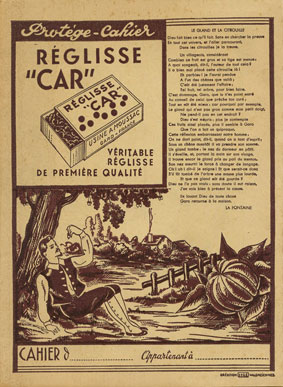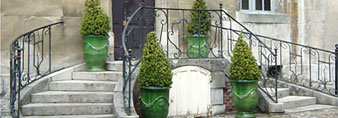THE ACORN AND GOURD (IX, 4)
God knows what He's about-no need to pry
Throughout the universe to make it known,
The gourd for me is proof alone.
A clown reflecting with attentive eye,
The fruit so large, the stalk so small :
" What meant," he cried, " the Power that formed us all ?
That gourd has not its proper place assigned-
Zooks ! I had hung it, in my mind,
To one of those strong oaks so tall-
That had been where it ought to be
For such a fruit, so such a tree.
Our curate talks of councils of the skies-
A pity, Ralph, thou couldst not then advise !
All had been better-for I ask them why
The acorn, just my little finger's size,
Hangs not in this place ? why it hangs so high ?
Sure God is wrong-more I reflect, 'tis so ;
For fruits thus placed, to Ralpho's eyes
Declare a glaring quiproquo."
Our clown was mach perplexed from hence :
" Folks do not sleep," he said, " with so much sense."
Under an oak he straight lay down to doze :
An acorn fell, and twinged the sleeper's nose.
He woke, and felt his chin with blood besmeared,
And found the acorn sticking in his beard ;
" So, ho ! " he cried, in wisdom less elate-
" I bleed! . . . but had it been a greater weight,
And had a gourd come tumbling from the tree,
What then, poor Ralpho, had become of thee ?
'Twas not God's will-the reason's good, I see."
He said, and grateful for the cause,
Went home adoring all God's laws. |
THE SCHOOLBOY, PEDAGOGUE,
AND OWNER OF A GARDEN (IX, 5)
A certain boy, well tinctured with his school,
A double rogue and double fool,
By youth, and by the privilege that season
Gives pedagogues to spoil their reason ;
A neighbour robbed of flowers and fruit, they say :-
This neighbour every autumn could display
The choicest gifts Pomona might bestow ;
While others but the refuse had to show.
Each season brought the tribute due ;
For in the Spring the richest gifts had he
That Flora offers the admiring view.
He in his garden saw one day our boy
Climb careless up a fine fruit-tree,
Spoil the young buds, his tender hopes destroy,
Forerunners of a plenty-promised year ;
The very branches he beheld him tear ;
Such havoc made, at last the owner sent
To his preceptor, on redress intent.
He came, and with him marched his hopeful school.
And'now behold the garden full
Of rogues still more advanced in rudeness :
So thus the pedant had the goodness
To make the owner's curse full weight.
"It w-as," he said, "to teach them all,
By such example and chastisement great,
Never into the like to fall."
On this the pedagogue important grew,
Maxims from Cicero and Virgil drew ;
Gave many strokes of knowledge too.
He cursed class, while thus their pedant toiled,
The garden in a hundred places spoiled.
I hate these ill-placed scraps of eloquence
That have no object, and no good dispense ;
Nor know I greater fool, or greater rogue,
Than is such scholar, or such pedagogue.
Of two such neighbours were I forced to choose,
I know not which the first I should refuse.
|
|

Exercise-book cover |
THE STATUARY AND STATUE OF JUPITER (IX, 6)
A sculptor said—who just had bought
The finest marble ever wrought--
What must my chisel here produce ?
A god, or cowl for common use ?
No, it shall be a god, I swear ;
His hand the thunder-bolt shall bear :
Mortals, fall down, or hence be hurled ;
Behold the sovereign of the world !
The idol's character he drew
So just, that when exposed to view,
They found that speech was all the odds
Between him and the king of gods.
The workman wondering at his feat,
Hardly the image saw complete,
When he the first a trembling stands,
Fearing the work of his own hands.
The sculptor's weakness was no more
Than the great poet showed before,
Who feared the wrath and venging pain
Of gods he formed in his own brain.
In this he showed himself a child
For thus are children self-beguiled,
Whose cares are all, poor silly souls !
Not to offend or hurt their dolls.
With ease the fancy rules the mind :
And from this source come down, we find,
The pagan errors that abound
Among so many nations round.
They were as mad with zeal, as vain
For the chimeras of their brain.
Pygmalion loved the Venus fine
Whose sire he was by chisel-line.
Each as he can or tries or seems
To realize his empty dreams :
Thus man to truth like ice replies,
And all on fire runs after lies.
|
|



